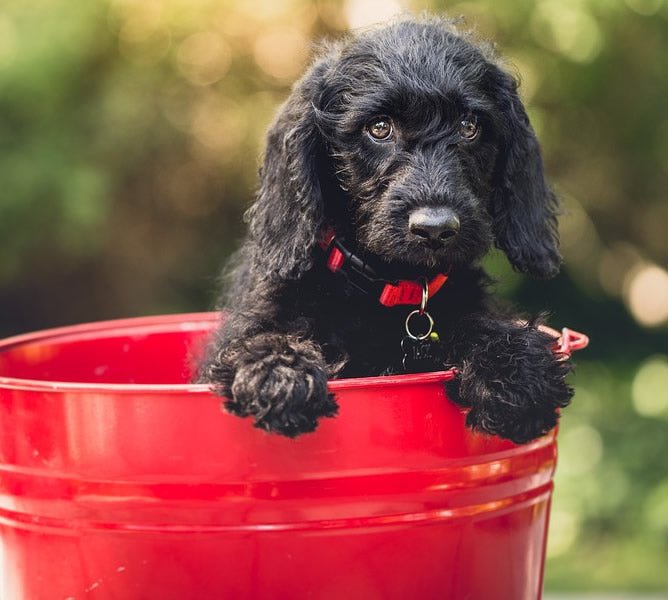I have plans in the works for a new Toller puppy in the Spring and I started thinking about my socialization opportunities and making a list. There are so many things that we should expose young puppies to in a positive manner
to try to ensure they grow into a well rounded adult. If you have a confident, happy and eager puppy, you'll want to grab some excellent treats and their favourite toys and head out to experience as much as possible. As we talked about in a previous post Should You Socialize That Puppy? not all puppies are created equal when it comes to approaching socialization. If you have a shy or fearful dog, you'll want to discuss the right approach with a qualified trainer who has a strong knowledge in behaviour.
For your average puppy, here are my top 10 broad categories:
People
Top of the list is all of the people your pup will meet! You want them to meet people of all shapes and sizes. Approach with lots of positive association tools like food and toys. It's not necessary for your dog to greet every single person they see, in fact, this can lead to hyper-enthusiasm. You want your pup to be comfortable meeting strangers, but not over the moon excited every time a stranger appears. Be careful you don't fall into the habit of making it a free-for-all. Sometimes, work on attention to you with people close by. Work on your favourite tricks and reward your dog for just being there with you with others around. Other times, give your puppy clear permission to say hello and allow them to enjoy their new friend.
Kids
Kids should be a high priority on your list as well. Kids move, act and smell differently. They can be loud and move quickly. Most puppies love playing with kids because they're fun to chase! You'll want to be sure you are not allowing your puppy to nip. Check our this previous post on teaching puppies bite inhibition. Again, as with adults, make sure you aren't creating hyper-enthusiasm for meeting kids. Be sure to find a good balance between pups greeting kids and learning to ignore them to focus on you instead.
Dogs
You'll definitely want to look into a puppy class that includes a play session for puppy socialization. You'll want your pup to learn to read other dog's communication and body language. Be sure to do your homework when looking for puppy classes. You'll want to be sure you are comfortable with the methods used and you'll want to know that all puppies have been properly vaccinated and health checked prior to joining.
Beware of strange dogs - not all dogs like puppies and often, a bad encounter can be had by randomly allowing greeting with strange dogs. Keep it to puppy class and friends with dogs you know are healthy and well adjusted. Don't allow your puppy to overwhelm another dog. Short greetings and small amounts of play with the right dog can go a long way!
Cars
From a young age, you'll want to get your pup out on short car rides. This will help them get used to the motion of being in a car and will help you avoid car sickness. We've visited the topic of Safe Car Travel before. Please try to make sure your pup is not at high risk of injury when traveling. A dog crate, barrier or harness is a wise investment.
In addition to riding in the car happily, we also want to socialize our dogs to traffic noise and start early attention work around cars to prevent car chasing. Dogs are predatory creatures and their instinct to chase is high. It's crucial that they are taught early that chasing cars is off limits!
Objects
Objects is a very broad category and can include anything! Garbage cans, fire hydrants, seasonal decorations - you'll want to expose your puppy to as much as possible to ensure they take things in stride. This is where lots of positive association work will help - bring along their favourite rewards and head out in search of things to introduce your young pup to.
Places
Parks and backyards aren't enough to help expose your pup to the world around you. Take them with you to as many places as possible. Pop into the local stores that allow dogs. Some Lowes, Home Depots, etc. allow dogs in. Places like Ren's Pet Depot and other pet supply stores typically allow dogs in as well. Do be careful with other dogs in the store though. They may not be friendly and you don't want your pup to have a bad experience. Consider carrying them with you and only putting them down when you know it's safe. Get them out to as many different locations as possible.
Noise
This is another broad category. You'll want to watch their reactions closely so as not to create sounds sensitivity issues, but exposing them to different noises is important if they take it well. I like to go to local sports games when possible - noises there are great for young pups. Consider car race tracks or other places with lots of bass. Stay as far from the action as you need to to keep your pup happy in this new environment.
Vets
Vet clinics are always a good place to expose your pup positively to. Most vets don't mind at all helping socialize a young puppy, in fact, most vets love it! Bring your pup in and practice weighing them. Let them get a cookie from the receptionist and vet tech. Work some handling exercises in the waiting room. Help them realize the vets is a great place to be. When you have an actual appointment, be sure to bring loads of treats and make it a positive spot to be! Here's a great post and video we've put together to help your pup learn to love the vets. The bottom line is, the vet will be a part of your dog's life and you want them to be comfortable there.
Groomers
This will be dependant on your lifestyle and the breed of dog you choose. If your dog will be professionally groomed somewhere, it's important that they have a pleasant association with being there. Be sure to take some time to introduce them to the sights, smells and sounds of a groomer.
Kennel
Where your dog will stay when you are on vacation is an important consideration. Kennels can be noisy and overwhelming. If they will be part of your dog's life, be sure you take some time to introduce them properly. Check out this previous post on wading through the task of helping reduce the stress of boarding.
When socializing, always take into consideration the risk VS reward level. If you are just starting out with your socialization, be sure to start small and build so as not to overwhelm your new dog. Start with one child, rather than a group. Start with quiet noises and build to louder. Always leave yourself the option to adjust what you are doing if the puppy looks uncomfortable. Remember, just like with kids, puppy time is over is a flash! Make the most of it and enjoy the time spent with your newest family member!
Happy Training!

